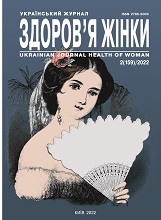Indicators of some sex hormones and cortisol in pregnancy dynamics in women who had a history of various types of infertility
DOI:
https://doi.org/10.15574/HW.2022.159.9Keywords:
pregnant women with a history of various types of infertility, dihydrotestosterone, free testosterone index, cortisolAbstract
Changes in the endocrine-metabolic balance in women with a history of various types of infertility are so weighty that they determine not only the nature of menstrual and reproductive disorders, but subsequently significantly distort the course of the gestational period.
Purpose - to study some indicators of sex hormones and stress hormone cortisol in women in pregnancy dynamics who had a history of different types of infertility.
Materials and methods. Some hormonal profile indicators have been studied: free testosterone index (FTI), dihydrotestosterone (DHT) and cortisol in women with a history of different types of infertility at 11-12 weeks and 36-38 weeks of pregnancy. 84 women aged 20 to 49 years were examined. Among these women to the group I were included 26, these are pregnant women who had a history of endocrine infertility; to the group II - 25 pregnant women with a history of tubular-peritoneal infertility; to the group III - 13 pregnant women who had a history of a combination of endocrine and tube-peritoneal factors; to the group IV (the control group) - 20 patients who independently became pregnant without infertility.
Results. There was an increase in cortisol concentration already at the beginning of gestation in the first trimester in pregnant women of the group I (80.8%), II (80%) and III (76.9%), while in the control group this indicator was significantly lower and was in 90% of patients at the level of physiological normal. In the third trimester, a further increase in cortisol was observed, both in women with a history of infertility (groups І-ІІІ) and in those who did not have infertility in the past (group ІV).
FTI in pregnant women of groups I and III was significantly increased, both in the first trimester (65.4% and 76.9%) and in the third trimester (69.2% and 84.6%), compared to the indicators in groups II and IV.
DHT in pregnant women I and III, both in the first trimester (61.5% and 84.6%) and in the third trimester (65.4% and 92.3%), exceeded the norm compared to the rates in the groups II and IV.
Conclusions. The detected deviations in the concentration of the stress-associated hormone cortisol with a high degree of probability may indicate an increased stress load, which in pregnant women after the use of treatment cycles and assisted reproductive technologies has been manifested since the beginning of pregnancy.
FTI and DHT in pregnant groups I and III were significantly increased compared to those in groups II and IV.
The research was carried out in accordance with the principles of the Helsinki Declaration. The study protocol was approved by the Local Ethics Committee of the participating institution. The informed consent of the patient was obtained for conducting the studies.
No conflict of interests was declared by the authors.
References
Dreval’ AV. (2016). Endokrinologiya. Rukovodstvo dlya vrachey. Moskva: GEOTAR-Media: 148-157.
ESHRE. (2019). Guideline on the management of recurrent pregnancy loss). Early Pregnancy Guideline Development Group: 2.
Kalugina LV, Tatarchuk TF. (2018). Novi mozhly’vosti korekciyi metabolichny’x porushen’ u zhinok z SPKYa. Reprodukty’vna endokry’nologiya. 39: 27-32. https://doi.org/10.7748/ns.32.27.39.s34
Mezhdunarodny`e rekomendaczii po oczenivaniyu i upravleniyu SPKYa-2018. (2018). Novy`e rekomendaczii po menedzhmentu paczientok s sindromom polikistozny`kh yaichnikov (SPKYa). Slovo o zdorove: 16.
Molchanova EV. (2015). Profilaktika akusherskikh i perinatal`ny`kh oslozhnenij u zhenshhin posle e`kstrakorporal`nogo oplodotvoreniya metodom intraczitoplazmaticheskogo vvedeniya spermatozoidov v yajczekletku: avtoref. dis. kand. med. nauk. Кiev: 18
Naczional`ny`j konsensus po vedeniyu paczientov s giperandrogeniej. (2016). Reproduktivnaya endokrinologiya. Кiev. 4 (30): 15.
Pirogova VI. (2019). Sovremenny`e trendy` v lechenii sindroma polikistozny`kh yaichnikov. Zdorov`e Ukrainy. 2 (34): 28-29.
Downloads
Published
Issue
Section
License
Copyright (c) 2022 Ukrainian Journal Health of Woman

This work is licensed under a Creative Commons Attribution-NonCommercial 4.0 International License.
The policy of the Journal UKRAINIAN JOURNAL «HEALTH OF WOMAN» is compatible with the vast majority of funders' of open access and self-archiving policies. The journal provides immediate open access route being convinced that everyone – not only scientists - can benefit from research results, and publishes articles exclusively under open access distribution, with a Creative Commons Attribution-Noncommercial 4.0 international license (СС BY-NC).
Authors transfer the copyright to the Journal UKRAINIAN JOURNAL «HEALTH OF WOMAN» when the manuscript is accepted for publication. Authors declare that this manuscript has not been published nor is under simultaneous consideration for publication elsewhere. After publication, the articles become freely available on-line to the public.
Readers have the right to use, distribute, and reproduce articles in any medium, provided the articles and the journal are properly cited.
The use of published materials for commercial purposes is strongly prohibited.

